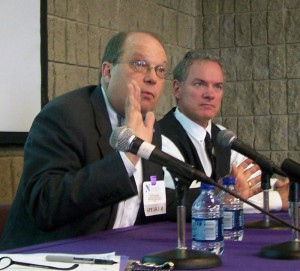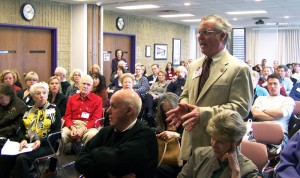Overbearing government scrutiny for a safer homeland — fair tradeoff?
It was this issue that was put under the microscope at a panel discussion on Saturday (4/16) exploring privacy and civil liberties in a post-9/11 era. The discussion was part of a series of events put together for “A day with Northwestern,” organized by the Northwestern Alumni Association at the Evanston campus.

Shearer
The event brought together former Department of Homeland security official Paul Rosenzweig and Craig LaMay, associate professor at Medill. The discussion was moderated by Ellen Shearer, co-director of the Medill National Security Journalism Initiative.
The government has implemented several data mining programs since the terror strikes 10 years ago (data mining involves looking for trends, patterns and correlations in electronic databases) . Recent news reports citing government sources said passenger pre-screening information on US-bound flights had prevented nearly 350 suspected terrorists from coming to America in the last 15 months alone.
“Data mining is one of the major tools the government has deployed for attempting to detect terrorists,” said Rosenzweig, currently a Carnegie Fellow with the Medill National Security Journalism Initiative, focusing on data mining. “The bad thing is that data has to be collected for everybody.”
With the invasion of technology in everyday life, like the mobile phone, credit cards and the internet, almost everyone has a record with a third party. According to Rosenzweig, existing privacy laws allow the government to access any individual information already present with a third party.
“Our privacy laws are out of date,” Rosenzweig said. “They do not match the technological capacity of today.”
It was a sentiment echoed by LaMay, who said, “Concerns of privacy are historically rooted in technological developments.”
LaMay served as a consultant on the Technology and Privacy Advisory Committee, which was appointed by Defense Secretary Donald Rumsfeld in 2003 to examine the Total Information Awareness program. The TIA program granted wide-reaching powers to the government and was eventually shelved.
While accepting the need for data mining when it comes to national security, LaMay argued there are some key factors to be kept in mind.
“Intelligence agencies have justified their powers on the basis of trust,” he said. “When I learned about all the data mining programs that the government operates, it became clear to me trust is not the model to go for.”
Oversight has to play a critical role to monitor government action, he said.
“Whatever surveillance power that the government has, the discussion of that has to be public,” LaMay said. “Non-transparent exercises of government power are not credible.”
“It seems to me the executive [branch] has decided that they are above the law,” LaMay said, referring to the “denial of service” attacks and cutting off the funding channels to WikiLeaks.
He added, “It sends a pretty easy signal to the Chinese and the Iranians as to what is OK in the world of surveillance and wiretap.”







